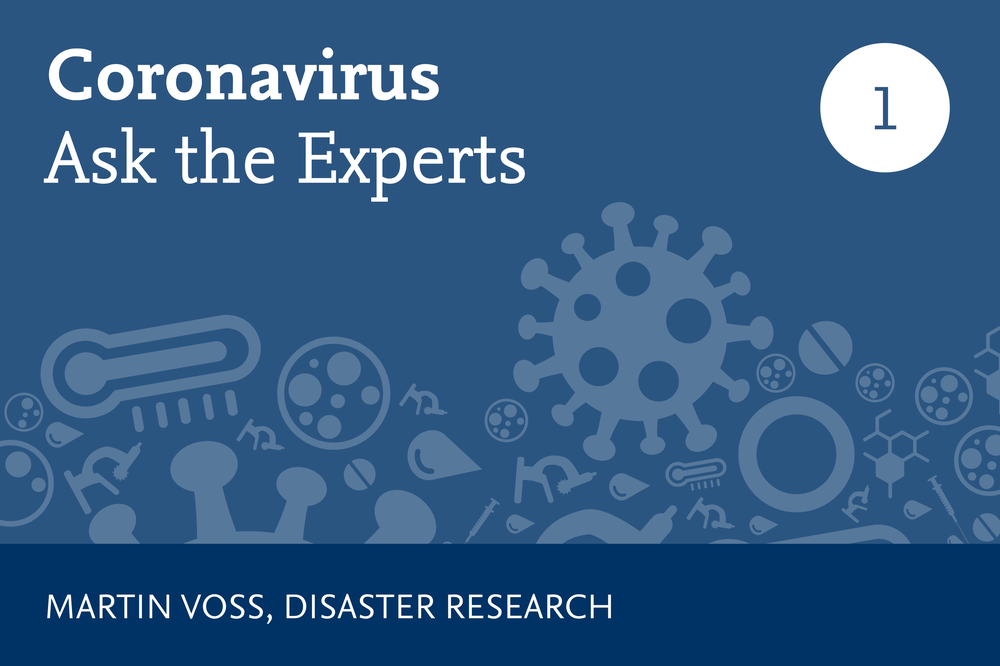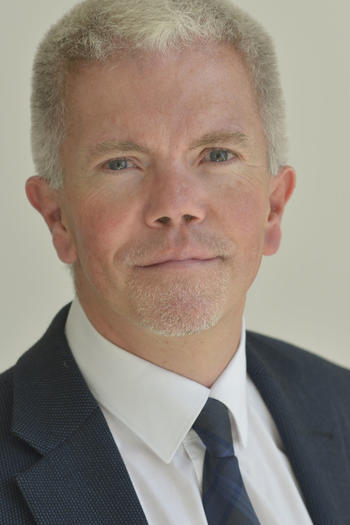“If we choose to, we can lay the groundwork to shape the future”
The first in a new series: “Coronavirus – Ask the Experts” / Part 1: Interview with Martin Voss, social scientist in the Disaster Research Unit at Freie Universität Berlin
Mar 31, 2020
The coronavirus pandemic from an academic perspective. In the first installment of our new series, Dennis Yücel speaks with sociology professor Martin Voss.
Image Credit: shutterstock.com/khaleddesigner
What changes has the coronavirus pandemic brought about? How has it influenced the lives of individuals? What impacts is it having on society, politics, the economy, research, and culture? A new series published in campus.leben, Freie Universität’s online magazine, asks scholars and scientists at our university to share their views on the current situation based on their professional backgrounds. The first interview was conducted by Dennis Yücel. He spoke with sociology professor Martin Voss about the danger of losing sight of socially disadvantaged populations and current research on the coronavirus being done in Freie Universität’s Disaster Research Unit.
Professor Voss, what do you, as an expert on disasters, make of how people in Germany are dealing with the coronavirus pandemic at the moment?
The fact that German society has gone along with strict, but necessary measures, such as the “ban on contact” that was just imposed, without conflict for the most part – I see that as extremely positive. It also shows that there is a solid relationship of trust between the citizens and state institutions in Germany. Even in light of justified criticism, the institutions are proving that they are capable of taking action within a federal system.
People here have a strong sense of commitment and voluntarily contribute to the collective good of society. But while the state and civil society have responded reasonably so far, a number of fundamental mistakes have become apparent when it comes to prevention.
Professor of Sociology Martin Voss has been the director of the Disaster Research Unit at Freie Universität since 2011.
Image Credit: Bernd Wannenmacher
What kind of mistakes exactly?
We have already seen that our medical infrastructure is actually very fragile, and now we are paying the price for not having thought globally. We are dependent on logistics systems for basic medical supplies, but these systems are subject to collapse. We don’t have enough equipment, like ventilators. We lack personal protective equipment and disinfectant. And we are short-staffed. We only have ourselves to blame: People are hardly interested in disaster prevention until the moment when the roof of their own house is on fire.
In general, our society does not pay enough attention to the situation in other countries. Now, our ignorance is taking its toll. But maybe we will learn from all of this that we are actually members of one big family on this incredibly closely knit planet. It is an historic opportunity, perhaps even a chance to define a new age.
You think that this catastrophe might be an opportunity?
In part, yes. It is essential to remember that a crisis like this is not simply a product of fate. We are in control of how we respond to it. In fact, disasters can show us just how much power we have to shape our world. If we choose to, we can lay the groundwork to shape the future.
What is at stake right now?
The German federal government is treating the current situation primarily from the perspective of an epidemiological problem. Although we do need to care for people who get infected and fall ill, we shouldn’t lose sight of other vulnerable populations. In Germany hundreds of thousands of people will face dire circumstances in the next weeks and months – worldwide, millions. The “ban on contact” poses real problems for people who are mentally ill, for example.
Unfortunately, we will probably see vast portions of society suffer secondary effects from the pandemic. Cases of alcohol and drug abuse as well as domestic violence will rise sharply. Suicide rates will go up. In the coming weeks, we will need to pay special attention to people who are prone to mental illness and make sure they get the care they need. But we also have to watch carefully what is going on in Africa and Asia. What will happen when the virus hits the slums? I fear the worst – and it will catch up with us, too.
Is the work you do in the Disaster Research Unit (DRU) involved with the coronavirus epidemic?
Our “quick response research” is already very much involved. Dr. Cordula Dittmer and Daniel F. Lorenz, two research associates in the DRU, are currently helping aid organizations, for example, with quarantine measures. They are looking at areas that are particularly problematic and what lessons from the “refugee crisis” in 2015 and 2016 might be useful in this situation. We are also assisting with the plans to build a supplementary hospital in Berlin’s trade fair exhibition halls. Personally, I am giving a weekly informational webinar on COVID-19.
We are also conducting a nationwide survey to assess the current mood in Germany. Dr. Katja Schulze is leading that project. We have already received many responses. Since we were not hired specifically for these jobs – it’s not contracted work – we can work independently. Our goal is to spot areas where the government or aid organizations need to take action.
It is very important that the population understands the logic and purpose behind the different measures. The most important resource we have to overcome this crisis is trust – trust in ourselves, trust in others, and trust in the institutions that are working to minimize damages.
Dennis Yücel conducted the interview.
The original German version of this article was published on March 26, 2020, in campus.leben, the online magazine of Freie Universität Berlin.
Further Information
Read all the interviews in the campus.leben series “Coronavirus – Ask the Experts”:
- Interview with Claudia Müller-Birn: “How should we design the tracing app so that people want to use it?”
- Interview with Tanja Börzel: “The European Union has proven its resilience in times of crisis”
- Interview with Professor Eun-Jeung Lee: “Many countries are now trying to learn from the Korean experience”
- Interview with Professor Joachim Trebbe: “We are communicating more than usual in bubbles”
- Interview with Stefan Gosepath: How Just is Our Society in Times of Crisis?
- Interview with Carolin Auschra: “Organizations and systems often change in times of great crisis”
- Interview with Professor Hansjörg Dilger: “The coronavirus pandemic is a mirror of globalization and the inequalities it has produced”
- Interview with Professor Lars Gerhold and Roman Peperhove: “Everyone is potentially affected, but everyone can also do something”
- Interview with Paul Nolte: “We are going to be working through this trauma for decades to come”
- Interview with Martin Voss: “If we choose to, we can lay the groundwork to shape the future”


